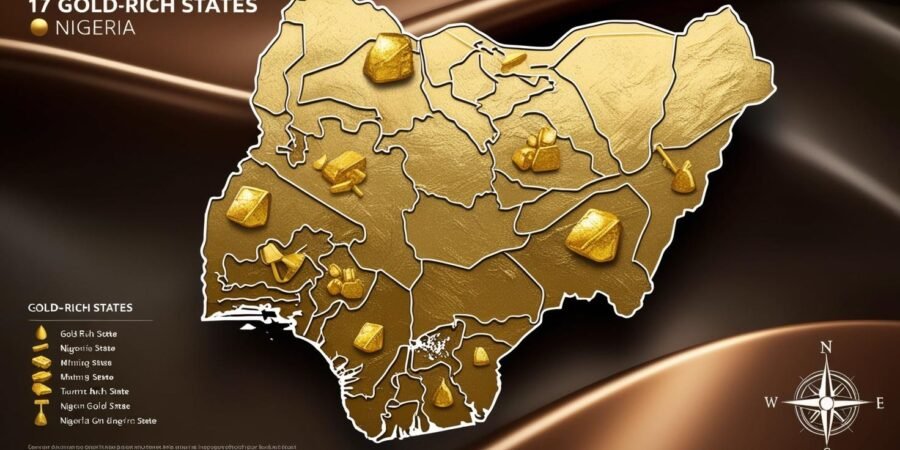Nigeria’s solid mineral sector is gaining momentum, with gold mining emerging as a significant contributor to economic diversification. Recent data from Google Console indicates a surge in searches related to “states with gold in Nigeria,” highlighting growing interest in this sector. While previous articles have covered about 10 states, extensive research reveals that at least 17 Nigerian states possess notable gold deposits. This article provides an in-depth exploration of these states, offering valuable insights for investors, miners, researchers, and policymakers. For a deeper dive into locating these reserves, consider our comprehensive guide, Gold Map: The Ultimate Guide to Gold Deposits in Nigeria.
1. Zamfara State
- Maru: Known for artisanal mining, Maru hosts alluvial gold deposits, particularly in the Duki and Maraba mines, situated within schist belts.
- Anka: Features both alluvial and lode gold deposits. Notable old mines include Kwali, Jameson, Zuzzurfa, and Kuba, where gold veins exploit the schist foliation.
- Malele: Gold-quartz veins are observed cutting through biotite gneiss and chlorite schist formations.
2. Kaduna State
- Birnin Gwari: A significant gold mining area with active communities. Tsohon Birnin Gwari and Kwaga exhibit gold reefs extending 7 km and 3 km respectively, with grades ranging from 5 to 100 g/t Au.
🟡 Thinking of exploring for gold in Nigeria? Whether you’re a miner, landowner, or investor, the GDX-8000 Gold Detector is the trusted tool transforming local gold discovery across Nigeria and West Africa.
Detect deeper, find faster, and uncover real opportunities beneath your land.
👉 Order your Original GDX-8000 NOW – exclusively from the Nigerian Mineral Exchange (NME), Nigeria’s leading mining marketplace.
💬 Chat directly with our support team on WhatsApp: +234 8130799304
3. Osun State
- Ilesha: A prominent gold mining hub with both alluvial and lode deposits.
- Atakumosa & Iperindo: Host significant gold mineralization. Iperindo’s gold-quartz carbonate veins occur within biotite gneiss and mica schist formations, with an estimated resource of 620,000 ounces.
4. Ondo State
- Okeagbe & Ifon: Emerging sites for gold mining activities, known for their mineral-rich landscapes.
5. Niger State
- Gurara, Shiroro, Gurmana, Zungeru: Regions renowned for gold-rich geological formations. Gurmana’s gold is associated with quartz-sulphide veins within amphibolites and gneisses.
6. Kogi State
- Okolom-Dogondaji: Features gold-quartz veins in N-S and NNE-trending shear zones within schists and amphibolites.
7. Kebbi State
- Bin Yauri: Hosts gold-sulphide-carbonate quartz veins within brittle fault zones, with grades of 5-15 ppm Au.
8. Ogun State
- Ajegunle-Awa: Minor gold occurrences in residual soils at the contact between amphibolites and pegmatites, with 26 ppm Au content.
9. Federal Capital Territory (FCT)
- Abuja: Significant gold deposits across various locations, including Apo, Gwagwalada, Bako, Kwali, and Abaji. Numerous riverbeds and streams within the FCT are known to contain gold.
10. Nasarawa State
- Uke, Zimbabwe axis, Angwan Mayo, Wamba: Exhibit significant artisanal gold mining activity. Recent discoveries have been reported in Angwan Mayo, located before Garaku.
11. Edo State
- Egbetua (Ososo, Akoko-Edo LGA): Hosts gold deposits, though illegal mining has led to environmental degradation and insecurity.
- Uneme-Erhurun, Sobe, Enwan, Dangballa, Ososo, Imorga: Identified as gold-bearing areas within the state.
12. Kwara State
- Alagbede (Moro LGA): Features gold-bearing quartz veins in meta-sediments overlying pegmatite gneiss basement.
- Odonigi (Moro LGA): Recognized for abundant gold resources, though challenged by illegal mining activities.
- Bishewa, Ologomo, Agboro, Korobiri, Degeji, Ndanaku, Mari, Oputa, Lokomosi, Tunga Bichi, Gbajubo, Giloadi, Birnin Ruwa: These areas exhibit gold mineralization associated with gneisses and schists, with assays ranging between 1.1g/t to 8.3g/t.
13. Sokoto State
- Tureta, Binji, Sabon Birni, Illela: Gold mineralization has been identified in these and other parts of Sokoto, placing the state among the growing gold-bearing regions of Northwestern Nigeria.
14. Katsina State
- Jibia, Dutsin-Ma, Faskari, Kankara: Multiple sites in Katsina have shown promising gold reserves, with artisanal mining activity reported across several local government areas.
15. Bauchi State
- Alkaleri, Toro, Tafawa Balewa: Gold has been discovered in several parts of Bauchi, especially within the basement complex zones. These deposits are associated with quartz veins and alluvial systems in river channels.
16. Taraba State
- Zing, Gashaka, Yorro, Sardauna: Reports of gold deposits in Taraba have emerged in recent years, especially in the mountainous and riverine areas. Artisanal miners are already active in some of these regions, with ongoing exploration efforts by geologists and private firms to determine the scale of the deposits.
17. Adamawa State
- Ganye, Toungo, Mayo-Belwa, Michika: Gold occurrences have been reported in several locations across Adamawa. Although detailed geological surveys are still in progress, local prospecting and panning activities suggest viable gold mineralization in the state’s basement complex and sedimentary belts.
To get a detailed understanding of the geology and precise locations within the states, refer to Gold Map: The Ultimate Guide to Gold Deposits in Nigeria.
🌍 The Expanding Gold Map of Nigeria
New gold discoveries are being reported almost weekly from previously undocumented locations across the country — from small streams to remote rural terrains. As more private explorers, mining cooperatives, and government agencies increase field activities, the list of gold-bearing states is expected to continue growing. Nigeria’s gold potential is far from fully mapped, and the country may hold far more gold reserves than currently known.
Government Crackdown on Illegal Mining
Recognizing the threat posed by illegal mining to national security, revenue, and environmental sustainability, the Nigerian government is aggressively addressing the issue through multi-pronged strategies:
- ✅ Establishment of Mining Marshals: A new specialized unit under the Nigeria Security and Civil Defence Corps (NSCDC), trained and deployed specifically to combat illegal mining operations nationwide.
- ✅ Technological Surveillance: A multi-billion naira budget has been allocated for the installation of advanced technology, including drone surveillance, satellite tracking, and digital monitoring systems to oversee and track mining activities in real time.
- ✅ EFCC and Law Enforcement Crackdowns: The Economic and Financial Crimes Commission (EFCC), in collaboration with other agencies, has arrested several illegal miners, foreign collaborators, and smuggling syndicates involved in the unlicensed export of gold.
- ✅ Collaboration with State Governments: The Ministry of Solid Minerals Development is working with states and traditional rulers to register local miners into cooperatives and integrate them into the formal sector.
🟡 Thinking of exploring for gold in Nigeria? Whether you’re a miner, landowner, or investor, the GDX-8000 Gold Detector is the trusted tool transforming local gold discovery across Nigeria and West Africa.
Detect deeper, find faster, and uncover real opportunities beneath your land.
👉 Order your Original GDX-8000 NOW – exclusively from the Nigerian Mineral Exchange (NME), Nigeria’s leading mining marketplace.
💬 Chat directly with our support team on WhatsApp: +234 8130799304
Conclusion
Nigeria’s gold wealth spans at least 16 states, but that number is expanding rapidly as exploration uncovers new deposits in rivers, rocks, and sediments across the nation. From the ancient mining fields of Zamfara and Osun to the emerging hotspots in Taraba and Sokoto, the gold narrative is becoming a nationwide story.
While illegal mining remains a challenge, bold reforms and enforcement actions are reshaping the sector. With increased investment, government backing, and responsible mining practices, Nigeria is poised to become a significant player in Africa’s gold economy — and perhaps one of the continent’s leading producers in the years ahead.
Ready to explore Nigeria’s golden potential? Join the Nigerian Mineral Exchange (NME) platform today to connect with miners, investors, and opportunities across the country’s top gold-producing states.
Ready to turn these hotspots into profitable ventures? Get your copy of Finding Gold in Nigeria: A Practical Guide for Landowners, Investors, and Prospectors today.

READ Also:
The Ultimate Guide to Starting a Mining Company in Nigeria
10 Smart Ways to Find Gold on Your Land in Nigeria
Need a Mining License or Mineral Trade Permit in Nigeria? Here’s How We Can Help
AKS 3D Gold Metal Detector – Affordable Entry-Level for Beginners in Nigeria




